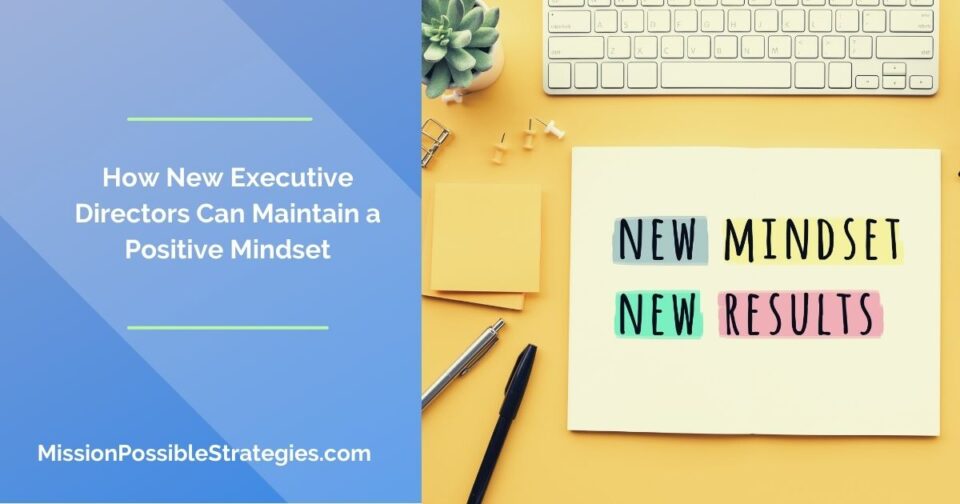This post discusses ways to maintain a positive mindset as a new nonprofit executive director.
As noted in my first post, I did market research by interviewing executive directors to better understand their dreams and challenges before I started my business. I wanted to see if things had changed very much since I began my career and if it’s easier to maintain a positive mindset.
When I look back over the last 30 years, I am amazed at how little has changed. The issues I struggled with as a first-time executive director are still relevant today
Although technology has changed dramatically (I didn’t even have internet or email when I started), the FEELINGS that new EDs experience have not changed.
After 6-12 months on the job, which I’ll call the Honeymoon Period, the excitement of the new job wears off. And you may be surprised to discover you struggle with maintaining a positive mindset.
1. A Positive Mindset When Your Board Won’t Fundraise:
National nonprofits teach that one of the primary responsibilities of board members is to ensure the financial sustainability of the organization. And we pay consultants to do annual board training on fundraising.
But the reality is that most board members do not “fundraise.” And when I say fundraise, I mean “ask other people for money.”
From my experience, executive directors want their board to fundraise more than anything else in the world. And it is probably the number one thing board members don’t want to do.
As the Executive Director, you are often responsible for providing training or arranging training about fundraising for your board. There is no other profession where you have to train your boss…. and motivate and inspire them.
Unfortunately, board members often join a board without a clear understanding of expectations around fundraising. This puts you, as the executive director, at a disadvantage if you’re expecting something that has not been previously clarified.
The board and executive director should work as partners to shoulder the task of fundraising, but often that just isn’t the case. The board’s failure to step up can create feelings of frustration and disappointment for you. Instead of viewing the board as a partner, you might start to see them as an obstacle.
If you and the board understand that fundraising is MORE than asking people for money, it can prevent confusion and disappointment.
Board members CAN learn to be ambassadors for your agency, but it takes work, time, and patience. Just knowing that most executive directors struggle with this issue can help you set realistic expectations to avoid disappointment and burnout.
2. A Positive Mindset When You Feel Insecure:
When the honeymoon is over, many executive directors struggle to maintain a positive mindset when they realize how steep the learning curve is for their new job. And they begin to doubt their competencies. They are afraid they will be “found out,” which is often referred to as imposter syndrome.
Many new executive directors start to realize they are unprepared for their new role. They might be hesitant to talk about their feelings for fear the board will question whether they have hired the right person.
Most EDs have not had years of mentoring. Many are former program directors who were promoted. When they were program directors, they did not deal with budgets, work with a board, or supervise staff.
Training for executive directors can be choppy and problematic. You can take a course here and there but you have to take time off from the office. And then you bring that thick notebook back to the office and put it on the shelf. You are so behind from taking a week off that you don’t have time to digest and apply the information from the course.
In addition, most nonprofits have a relatively flat organization chart so executive directors rarely work their way up the management ladder. For example, there is usually no assistant executive director who is then promoted to associate executive director and then to executive director. Some new EDs feel they have been thrown into a “sink or swim” situation.
Summary: If you’re feeling frustrated and insecure in your post-honeymoon period, try to acknowledge and talk about those feelings. Joining a network of executive directors can help. Talking about your feelings with others who are experiencing the same situations can be rejuvenating. Sometimes it can be hard to find a group in which you feel safe but keep looking. If professional development funds are available in your budget, reach out for personalized coaching and mentoring. Click here for more information about how my signature program can help you.


